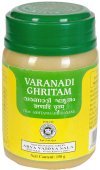Vishanika, Viṣāṇikā: 7 definitions
Introduction:
Vishanika means something in Hinduism, Sanskrit, biology. If you want to know the exact meaning, history, etymology or English translation of this term then check out the descriptions on this page. Add your comment or reference to a book if you want to contribute to this summary article.
The Sanskrit term Viṣāṇikā can be transliterated into English as Visanika or Vishanika, using the IAST transliteration scheme (?).
In Hinduism
Ayurveda (science of life)
Rasashastra (Alchemy and Herbo-Mineral preparations)
Source: Wisdom Library: Rasa-śāstraViṣāṇikā (विषाणिका):—One of the sixty-seven Mahauṣadhi, as per Rasaśāstra texts (rasa literature). These drugs are useful for processing mercury (rasa), such as the alchemical processes known as sūta-bandhana and māraṇa.
Nighantu (Synonyms and Characteristics of Drugs and technical terms)
Source: WorldCat: Rāj nighaṇṭu1) Viṣāṇikā (विषाणिका) is another name for Āvartakī, a medicinal plant identified with Cassia auriculata, synonym of Senna auriculata (matura tea tree) from the Fabaceae or “legume” family of flowering plants, according to verse 3.135-136 of the 13th-century Raj Nighantu or Rājanighaṇṭu. The third chapter (guḍūcyādi-varga) of this book contains climbers and creepers (vīrudh). Together with the names Viṣāṇikā and Āvartakī, there are a total of eleven Sanskrit synonyms identified for this plant.
2) Viṣāṇikā (विषाणिका) is also mentioned as a synonym for Sātalā, an unidentified medicinal plant (seven possible species identifed), according to verse 4.194-195. The fourth chapter (śatāhvādi-varga) of this book enumerates eighty varieties of small plants (pṛthu-kṣupa). Together with the names Viṣāṇikā and Sātalā, there are a total of thirteen Sanskrit synonyms identified for this plant.

Āyurveda (आयुर्वेद, ayurveda) is a branch of Indian science dealing with medicine, herbalism, taxology, anatomy, surgery, alchemy and related topics. Traditional practice of Āyurveda in ancient India dates back to at least the first millenium BC. Literature is commonly written in Sanskrit using various poetic metres.
Biology (plants and animals)
Source: Wisdom Library: Local Names of Plants and DrugsVisanika in the Sanskrit language is the name of a plant identified with Dolichandrone falcata (Wall. ex DC.) Seem. from the Bignoniaceae (Jacaranda) family having the following synonyms: Spathodea falcata. For the possible medicinal usage of visanika, you can check this page for potential sources and references, although be aware that any some or none of the side-effects may not be mentioned here, wether they be harmful or beneficial to health.
Visanika [विषाणिका] in the Sanskrit language is the name of a plant identified with Pergularia daemia (Forssk.) Chiov. from the Apocynaceae (Oleander) family having the following synonyms: Asclepias daemia, Daemia extensa, Cynanchum extensum.
Visanika in the Sanskrit language is the name of a plant identified with Aristolochia bracteolata Lam. from the Aristolochiaceae (Birthwort) family having the following synonyms: Aristolochia kotschyi, Aristolochia abyssinica.
Source: Google Books: CRC World Dictionary (Regional names)1) Visanika in India is the name of a plant defined with Aristolochia bracteolata in various botanical sources. This page contains potential references in Ayurveda, modern medicine, and other folk traditions or local practices It has the synonym Aristolochia bracteata var. bracteata (among others).
2) Visanika is also identified with Daemia extensa It has the synonym Doemia extensa R. Br. (etc.).
3) Visanika is also identified with Pergularia daemia It has the synonym Cynanchum extensum Jacq. (etc.).
4) Visanika is also identified with Senna auriculata It has the synonym Cassia densistipulata Taub. (etc.).
Example references for further research on medicinal uses or toxicity (see latin names for full list):
· Resultati Scientifi ci della Missione Stefanini-Paoli nella Somalia Italiana (1916)
· Systema Naturae, ed. 12 (1767)
· Systema Vegetabilium (1820)
· Journal of the Bombay Natural History Society (1933)
· Flora Aegyptiaco-Arabica (1775)
· Encyclopédie Méthodique, Botanique (Lamarck) (1783)
If you are looking for specific details regarding Visanika, for example chemical composition, pregnancy safety, health benefits, side effects, extract dosage, diet and recipes, have a look at these references.

This sections includes definitions from the five kingdoms of living things: Animals, Plants, Fungi, Protists and Monera. It will include both the official binomial nomenclature (scientific names usually in Latin) as well as regional spellings and variants.
Languages of India and abroad
Sanskrit dictionary
Source: Cologne Digital Sanskrit Dictionaries: Shabda-Sagara Sanskrit-English DictionaryViṣāṇikā (विषाणिका).—f.
(-kā) A sort of plant, commonly Mesha Shringi. E. viṣāṇī as above, and kan pleonasm; fem. form.
Source: Cologne Digital Sanskrit Dictionaries: Monier-Williams Sanskrit-English DictionaryViṣāṇikā (विषाणिका):—[from viṣāṇaka > viṣāṇa] f. (ikā) Name of various plants (Odina Pinnata; the Senna plant; Asclepias Geminata; = karkaṭa-śṛṅgī and sātalā), [cf. Lexicographers, esp. such as amarasiṃha, halāyudha, hemacandra, etc.]
Source: Cologne Digital Sanskrit Dictionaries: Yates Sanskrit-English DictionaryViṣāṇikā (विषाणिका):—(kā) 1. f. Mesha shringi.
Sanskrit, also spelled संस्कृतम् (saṃskṛtam), is an ancient language of India commonly seen as the grandmother of the Indo-European language family (even English!). Closely allied with Prakrit and Pali, Sanskrit is more exhaustive in both grammar and terms and has the most extensive collection of literature in the world, greatly surpassing its sister-languages Greek and Latin.
See also (Relevant definitions)
Ends with: Dvishanika, Govishanika, Kshiravishanika, Kuliravishanika, Mendavishanika, Meshavishanika, Upavishanika.
Full-text: Meshavishanika, Kuliravishanika, Kshiravishanika, Vishanaka, Avartaki, Mahaushadhi, Avartaka, Satala.
Relevant text
Search found 7 books and stories containing Vishanika, Viṣāṇikā, Visanika; (plurals include: Vishanikas, Viṣāṇikās, Visanikas). You can also click to the full overview containing English textual excerpts. Below are direct links for the most relevant articles:
Sahitya-kaumudi by Baladeva Vidyabhushana (by Gaurapada Dāsa)
Text 9.25 < [Chapter 9 - Ornaments of Sound]
Bhakti-rasamrta-sindhu (by Śrīla Rūpa Gosvāmī)
Verse 2.1.374 < [Part 1 - Ecstatic Excitants (vibhāva)]
Sushruta Samhita, volume 1: Sutrasthana (by Kaviraj Kunja Lal Bhishagratna)
The Agni Purana (by N. Gangadharan)
Chapter 285 - The accomplished recipes that would revive the dead (mṛtasañjīvanī)
Chapter 363 - The words denoting earth, city, forest and herbs
Sushruta Samhita, Volume 6: Uttara-tantra (by Kaviraj Kunja Lal Bhishagratna)
Chapter LX - Symptoms and Treatment of demonology (Amanusha) < [Canto IV - Bhuta-vidya-tantra (psychology and psychiatry)]
Sushruta Samhita, volume 4: Cikitsasthana (by Kaviraj Kunja Lal Bhishagratna)
Related products


